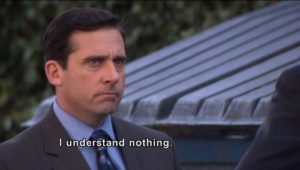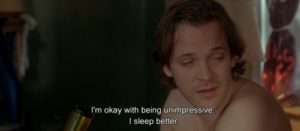
Classes are hard to manage on their own, especially when you’re trying to balance a sport, extra curricular activities, clubs, etc. And when you get a test or paper back that you really needed or wanted to do well on, it can feel like the floor is opening up beneath you when you see that letter or number that is much lower than you wanted. Sometimes it feels like it’s a dream, like it couldn’t possibly be real. Sometimes, I wait to look at my score, just so I can delay my disappointment, and sometimes I feel exactly like Christina does above. The truth is, it’s hard to deal with a low score or grade and it’s hard not to let your mind wander and conjure up all the horrible things that will happen because of that one paper or test. It’s hard to remember that one test is not going to make or break your college career and it’s even harder to admit that maybe, just maybe, you and your studying habits were a large portion of why that score was so low.
I will say that there are times when professors are “weird” graders, where you got docked points for something so trivial, even when it was obvious that you knew the material. But a lot of the time, feeling upset about a grade often stems from knowing that we could’ve done more to prepare, could’ve spent more time developing a thesis, or spent more time in office hours. This is hard, because we have to admit to ourselves that we have messed up. But in so many ways, this can be liberating, because it means that, although we had the power to make those mistakes, we also have the power to amend them and work harder the next time. For me, I like to make a study schedule, where I just study a little bit each day leading up to the test. If I have a schedule, I am likely to stick to it and thus, I get all the studying done that I want and don’t have to worry about running out of time the night before. First I make a list of everything I want to do to prepare, and then I map out when I will get each of those things done. By doing a little bit each day, it makes the whole process a lot less daunting and relieves a lot of stress.
When you know that you have studied everything you felt was most important and that you spent a lot of time preparing, you can go into the test with more confidence. That in itself makes such a difference. There have often been instances where I make a mistake, not because I don’t know the material, but because I am not confident enough, end up second guessing myself, and changing my answer at the last minute. For me, that is the worst feeling- when you know that you knew a certain concept, but it didn’t show on the test. And sometimes I really do feel like this:.gif)
Tests and papers can be daunting and the grades you get on them can seem like the end of the world if they’re not what you wanted, but no test score or grade is equivalent to your worth as a human and it’s unlikely that one bad grade can determine your success in or after college. Your grades do not tell anyone anything except for how well you showed your understanding of a specific material on that given day. Remember that you are so much more than your grade. 



